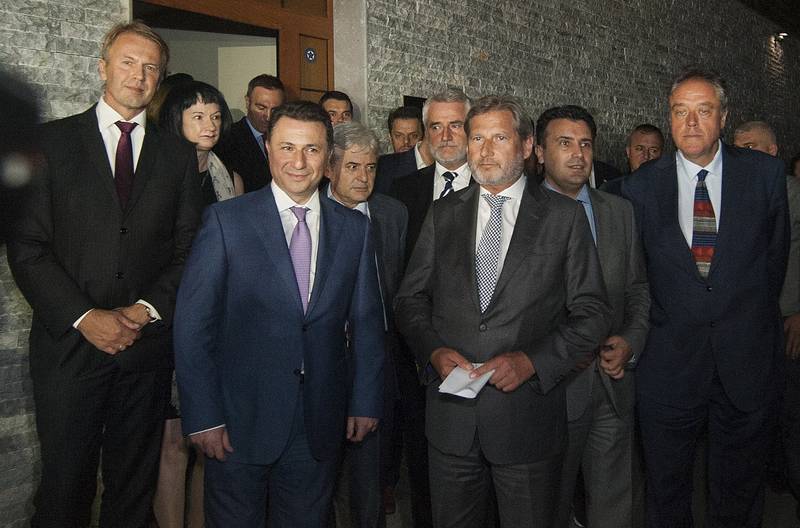Commission Knows Not What To Do with Macedonia
Adelina Marini, May 18, 2016
 Whatever government is produced by the snap parliamentary elections in Macedonia, it would not be recognised as a credible partner of the international community, because three of the four major political parties in the former Yugoslav republic will not be participating in the elections. This was stated by the spokesperson of the European Commission for neighbourhood policy Maja Kocijančič during the regular briefing of the European Commission. She used the question asked by a Macedonian journalist to state that the country’s political crisis is driving Macedonia away from its Euro-Atlantic goal. The fact that several parties have not entered lists with candidates to the state election commission before the deadline means that the conditions for having credible elections are missing. And this was the main prerequisite in the agreement, signed in Pržino on June 2nd of last year.
Whatever government is produced by the snap parliamentary elections in Macedonia, it would not be recognised as a credible partner of the international community, because three of the four major political parties in the former Yugoslav republic will not be participating in the elections. This was stated by the spokesperson of the European Commission for neighbourhood policy Maja Kocijančič during the regular briefing of the European Commission. She used the question asked by a Macedonian journalist to state that the country’s political crisis is driving Macedonia away from its Euro-Atlantic goal. The fact that several parties have not entered lists with candidates to the state election commission before the deadline means that the conditions for having credible elections are missing. And this was the main prerequisite in the agreement, signed in Pržino on June 2nd of last year.
In it, political parties in the country, with the intermediation of the EU, agreed to place Macedonia’s interests above all and confirmed the state’s Euro-Atlantic commitment. They also discussed holding preliminary elections by European standards by the end of April 2016. This deadline was missed and a new one was set – June 5. The EC feels, however, that the minimum conditions for holding elections at that date are not present. On July 15 of last year a protocol was signed with the facilitation of Commissioner for Enlargement Negotiations Johannes Hahn (Austria, EPP) and the MEPs Ivo Vajgl (ALDE, Slovenia), Eduard Kukan (EPP, Slovenia), and Richard Howitt (Socialists and Democrats, Great Britain), in which the sides commit to fully implementing the Pržino agreement and set a date for holding preliminary elections – April 24th, 2016.
On April 21st of this year, however, the four of them came out with a special declaration, in which they expressed disappointment of the lack of progress and political will and warned that the failure of the Pržino agreement will have dire consequences for the country. They also threatened additional actions without giving details. Spokesperson Kocijančič was asked several times what will follow if the agreement failed and does the EC consider it dead already, but failed to answer. The EU so far has no contingency plan of what actions is it to undertake from now on if its demands as a mediator are not met, among which are the issues with the rule of law, overthrowing the presidential pardon for those involved in the wiretap scandal from last year, and securing balanced media coverage.
The EC stated that it was available to aid, but no more. Bulgarian Foreign Minister Daniel Mitov recently stated in Zagreb that holding elections in the absence of opposition is pointless. “How do you conduct elections when the main opposition party has said ‘we're not going to participate’“, he asked and added that he does not know exactly what the opposition wants. “I’m already quite confused. My confusion and the confusion of a lot of others comes from a fact that after last year's instability of political crisis, there was a clear agreement, with clear goals, with clear ideas what needs to be done in order to reach the moment for elections. [...] Everyone signed this agreement. And all of a sudden, we're witnessing again a turbulence which blows up completely the agenda that was set up by the same leaders”, further said Mr Mitov. He expressed his utter puzzlement by the decision of the president to pardon over 50 people, who were investigated by the prosecution on the wiretap scandal. “That decree was to me an enigma”, said the Bulgarian foreign minister during his two-day visit in Zagreb.
According to him, it is time to come up with a new approach. A way must be found out of the standard thinking and find a new solution with higher EU commitment, he proposed and warned that the crisis in Macedonia could spill over all of the Western Balkans, and this is sure to be used by Russia. In the meantime, BalkanInsight reported that there are ideas brewing among the Macedonian Albanians for the creation of a federation. Albanians in Macedonia think that Albanian political parties have failed their trust and have not made sure they have equal rights with Macedonians. Thus, it is time to discuss a new state construction, says the article. All of this feeds more fuel to the crisis fire.
Translated by Stanimir Stoev
 Bakir Izetbegovic, Andrej Plenkovic | © Council of the EU
Bakir Izetbegovic, Andrej Plenkovic | © Council of the EU Aleksandar Vucic, Recep Tayyip Erdogan | © Serbian Presidency
Aleksandar Vucic, Recep Tayyip Erdogan | © Serbian Presidency Jean-Claude Juncker, Zoran Zaev | © European Commission
Jean-Claude Juncker, Zoran Zaev | © European Commission